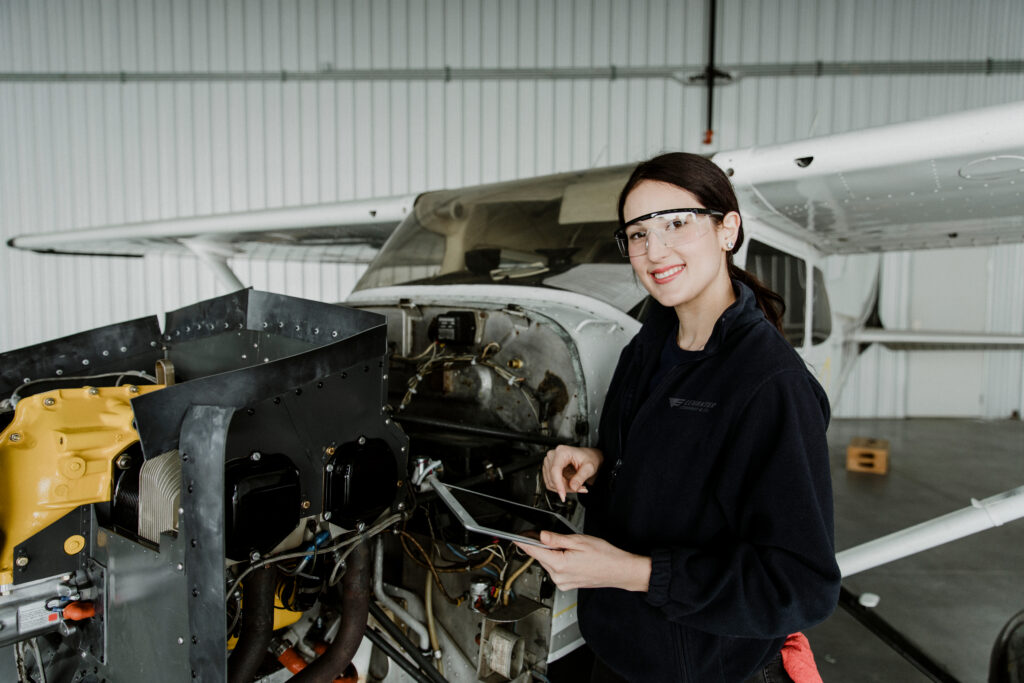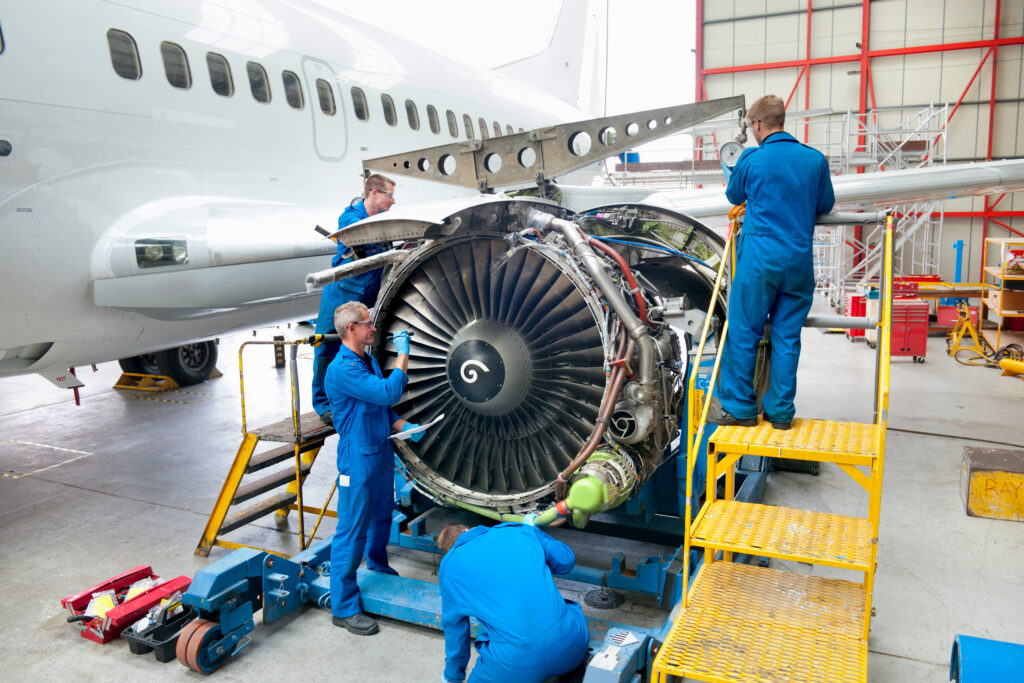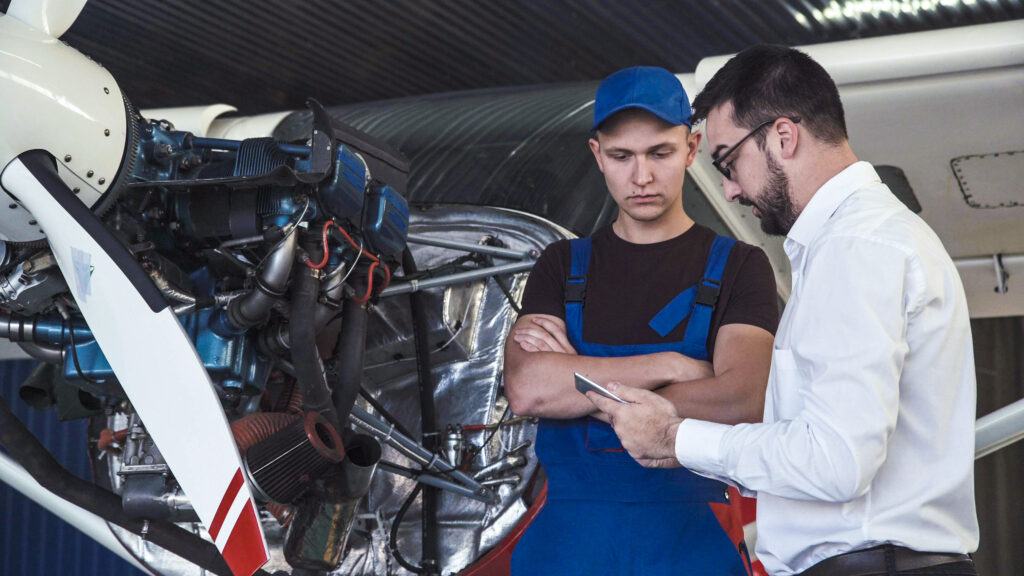If you’re looking for a hands-on career in the aviation industry, becoming an aviation maintenance technician might be the right path for you. Whether you’re thinking about attending an aviation school or earning an aviation degree, this field offers plenty of opportunities. You can choose from different types of aviation degrees, like an aviation operations degree or a degree in aviation maintenance. If you’re searching for an aviation degree, this article will help you explore your options and see how a career in aviation maintenance can take you to new heights.

Why Consider a Career in Aviation Maintenance?
We could give you an easy answer and tell you because it’s a good opportunity, but we’re not going to do just that. Instead, let’s dive into 9 reasons why you should consider going to aviation school.
1. High Demand for Skilled Technicians.
The aviation industry is growing, with an increasing number of commercial flights, private jets, and military aircraft in operation. This growth has created a significant demand for skilled aviation maintenance technicians who can ensure these aircraft are safe and operational. Schools like the Aviation Institute of Maintenance (AIM) are responding to this demand by offering comprehensive training programs designed to equip students with the skills needed to succeed in this high-demand field.
According to industry reports, such as Boeing’s annual Pilot and Technician Outlook, the need for aviation maintenance professionals is expected to continue rising. The report forecasts the demand for pilots, maintenance technicians and cabin crew over a 20-year period, and latest renditions predict an increase global demand, especially in regions of growing air travel markets such as North America.
Similarly, the Federal Aviation administration (FAA) annually publishes an Aerospace Forecast and Oliver Wyman publishes Global Fleet and MRO (Maintenance, Repair and Overhaul) Market Forecast. The 2024-2034 report provides detailed projections on the demand for MRO services and highlights the trends in aircraft maintenance that impact the need for technicians, as well as the growth trajectory despite de slowing of the global economy.
2. Essential Role in Aviation Safety
As long as aviation exists, aviation mechanics will be needed. Aviation mechanics are the backbone of flight safety. Their work ensures that every aircraft meets the strict safety standards set by aviation authorities. This responsibility gives the career a sense of purpose and importance, as mechanics directly contribute to the safety of passengers and crew. For those who take pride in their work, knowing they play a critical role in preventing accidents and maintaining the integrity of the aviation industry can be highly rewarding.
3. Hands-On, Technical Work
For individuals who enjoy working with their hands and solving complex mechanical problems, aviation maintenance offers a highly satisfying career path. The job involves diagnosing issues, repairing aircraft components, and ensuring everything is in top working order. This type of hands-on, technical work is ideal for those who prefer an active job that challenges their skills and keeps them engaged.
4. Opportunities for Advancement
Aviation maintenance is a field with clear pathways for career advancement. Starting as an entry-level technician, there are opportunities to move into specialized roles, such as avionics technician, lead mechanic, or quality control inspector. With experience and additional certifications, some mechanics advance to supervisory or management positions. The field also offers opportunities to transition into related areas, such as aircraft design, manufacturing, or even teaching at a technical school. According to the FAA, there are various certification pathways and additional rating that aviation mechanics can pursue to advance their careers. These additional certifications, such as Inspection Authorization (IA) or specialized training in avionics, can lead to higher-paying positions and more responsibility. When we say the sky is the limit, we mean it!
For a bigger list of aviation focused programs, looking at the offers from aviation schools like AIM is a big help. These schools usually have an entire page dedicated to the different options they offer.
5. Competitive Salaries and Benefits

Aviation maintenance technicians are well-compensated for their expertise. The average salary for an aircraft mechanic is competitive, and many positions offer additional benefits such as health insurance, retirement plans, and opportunities for overtime pay. Specialized roles, such as those in avionics or working on advanced aircraft, often command even higher salaries. Moreover, some employers offer bonuses or tuition reimbursement programs, making the financial outlook for this career quite attractive. Institutions like the Aviation Institute of Maintenance (AIM) may also offer financial aid and support options to help students manage the cost of their education and maximize their return on investment.
6. Diverse Work Environments
Aviation mechanics can work in a variety of settings, from bustling international airports to quieter regional facilities, and even on military bases (think Top Gun). This diversity allows technicians to find a work environment that suits their preferences. Whether one prefers the fast-paced environment of a major airline’s maintenance hub or the steady work at a private aviation company, there are options to fit different lifestyles and career goals.
7. Job Satisfaction and Pride
Aviation maintenance is a career that offers a high level of job satisfaction. The sense of accomplishment from solving complex problems and keeping aircraft flying is a significant motivator for many in the field. Additionally, being part of the aviation industry—a field synonymous with innovation and cutting-edge technology—gives mechanics a sense of pride in their work. Taking pride in your work has a ripple effect, it impacts your overall performance but also benefits team dynamics and overall satisfaction.
8. Travel and Global Opportunities
While aviation mechanics primarily work at fixed locations, the industry’s global nature can present opportunities for travel. Mechanics working for international airlines or global aerospace companies may have the chance to work on aircraft in different parts of the world or even relocate for a position in a new country. This global aspect of the career can be particularly appealing to those who enjoy travel or are interested in experiencing different cultures.
9. Contribution to Innovation
The aviation industry is constantly evolving, with new technologies and advancements being developed regularly. Aviation mechanics play a crucial role in integrating and maintaining these innovations, from more fuel-efficient engines to advanced avionics systems. Being part of this process allows mechanics to stay at the forefront of technological developments, making the career both exciting and forward-looking.

Let’s think Requirements and Credentials
For a career in this field there are some specific requirements, specialties and credentials required. No need to worry, though, the FAA makes it easy to understand. According to the FAA, there are two wayts you can obtain the training and experience you need to get your aviation degree and become an FAA-certified Airframe or Powerplant Mechanic:
1) Academic training through an FAA-certified Aviation Maintenance Technician School (AMTS), such as the Aviation Institute of Maintenance;
or 2) “On-the-job training (OJT) that provides practical experience with the procedures, practices, materials, tools, machine tools, and equipment generally used in constructing, maintaining, or altering airframes or powerplants, appropriate to the rating sought.” Once you meet this OJT, there are different A&P refresher courses and prep courses that will help you prepare and pass the airman knowledge practical tests.
Specialties in Aviation Mechanics
As we mentioned previously, there are different specialties that you can pursue after getting your degree in aviation mechanics. Whether that is airframe maintenance, powerplant maintenance, avionics, or inspection authorization, you will find something that suits your interests.
Airframe Maintenance
Focus: Airframe mechanics specialize in the maintenance and repair of an aircraft’s structure and systems, excluding the engines. This includes work on the fuselage, wings, landing gear, and control surfaces.
Skills Required: Knowledge of aircraft structural design, materials, and repair techniques. Proficiency in using tools and equipment for tasks such as welding, riveting, and composite repairs.
Powerplant Maintenance
Focus: Powerplant mechanics focus on the aircraft’s engines, including both reciprocating (piston) engines and turbine (jet) engines. This specialty involves inspecting, repairing, and maintaining the engines and their associated systems.
Skills Required: Understanding of engine operation, thermodynamics, fuel systems, and troubleshooting. Experience with engine disassembly, inspection, and reassembly.
Avionics
Focus: Avionics technicians specialize in the maintenance and repair of an aircraft’s electronic systems, including navigation, communication, and flight control systems. With the increasing complexity of aircraft electronics, this specialty is becoming more critical.
Skills Required: Strong background in electronics, electrical systems, and computer technology. Proficiency in troubleshooting and repairing complex avionics systems, including software updates and configuration.
Inspection Authorization (IA)
Focus: Mechanics with Inspection Authorization are qualified to inspect aircraft and sign off on major repairs and alterations. This advanced credential allows mechanics to take on more responsibility and is often a step toward supervisory roles.
Skills Required: In-depth knowledge of FAA regulations, inspection procedures, and documentation. Strong attention to detail and experience in various aspects of aircraft maintenance.
It’s not as difficult as you’d think!
Becoming an aviation maintenance technician requires dedication and a commitment to learning. The coursework and hands-on training are rigorous, but with the right mindset and support, many students successfully complete their programs. The difficulty level is manageable, especially for those with a strong interest in aviation and mechanics.

Training Options
For those considering a career in aviation maintenance, enrolling in a reputable school is the first step. The Aviation Institute of Maintenance (AIM) offers FAA-approved programs across multiple campuses nationwide, providing hands-on training with experienced instructors. AIM is a prime example of an FAA-certified Aviation Maintenance Technician School that offers both the academic training and hands-on experience required to succeed in this field. However, AIM is just one of several options; other schools also offer excellent training programs that can lead to a successful career in aviation maintenance.
When considering a career in aviation maintenance, it’s important to explore all your options to find the program that best suits your needs. While the Aviation Institute of Maintenance (AIM) offers excellent training programs, other aviation schools also provide top-notch education in this field. For example, Embry-Riddle Aeronautical University is renowned for its comprehensive aviation maintenance programs, while Spartan College of Aeronautics and Technology offers specialized training in avionics and nondestructive testing. Pittsburgh Institute of Aeronautics (PIA) has a strong reputation for its hands-on approach to aviation maintenance education, and the National Aviation Academy (NAA) is known for its robust programs in both maintenance and avionics. Universal Technical Institute (UTI), through its partnership with MIAT College of Technology, also offers solid training in aircraft systems. Each of these institutions, including AIM, provides valuable pathways into the aviation maintenance industry, ensuring that students are well-prepared for successful careers.

1 thought on “Aviation School Can Launch Your Career in Maintenance”